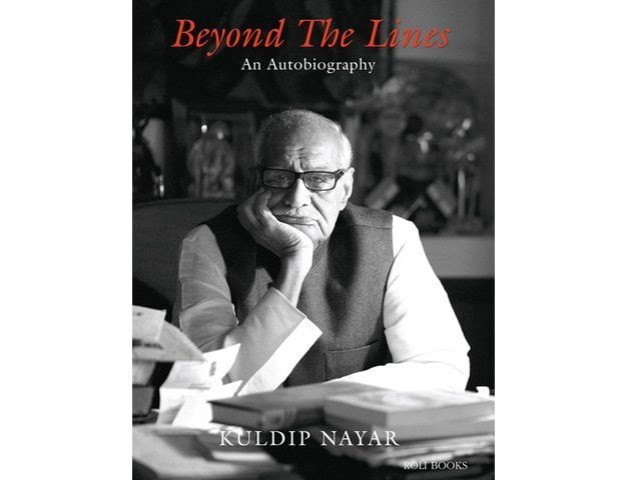Beyond borders: Getting rid of partition’s ‘negative baggage’
Kuldip Nayar reminisces at his book launch.

Journalist and author Kuldip Nayar's book 'Beyond the Lines'. PHOTO: PUBLICITY
“The few qualities, which people think I possess, are not only due to the land I live in now - India - but also have to do with the land I lived in as a young man, now called Pakistan”, journalist and author Kuldip Nayar said on Monday. He was speaking at the launch of his book Beyond the Lines.
Now 90 years of age, Nayar has long been advocating better relations between India and Pakistan. He has visited Pakistan several times for this purpose.
Nayar said that unlike other non fiction books, which require intensive research, he had written one from memory alone. “Despite my age there are things that are etched in [my] memory, which I have reproduced in the book”. The book, he said, took nearly three months to write. Nayar had hoped to launch it from his hometown, Sialkot, but said he had been advised against it by local publishers. The book has been translated into more than 10 languages in India. It is currently being translated in Bangladesh, where it is to be launched soon. In Pakistan, the book has been translated into Urdu with the title Ek Zindagee Kaafi Naheen.

Nayar said there was great longing amongst Indians to visit Pakistan. He added that both countries should work to ensure greater facilitation in visa issues. “It’s not because of old familial ties or associations that people from the two countries want to visit one another. Its more about trying to get to know one another”, he said.
Nayar said he found the killing during 1947 on both sides of the border shameful. He said official figures suggested that around 1 million lives had been lost, but in a personal encounter with Lord Mountbatten he had told him that the figure was nearly 25 million. He said as a young lawyer he had wanted to live in Pakistan, but circumstances had forced him to do otherwise. “And I am sure that the situation I faced in Sialkot was faced by several people in India who were forced to move to Pakistan.” He said that despite the harsh memories, he thought it necessary to get rid of the ‘negative baggage’ from Partition. “My dream is that this region be transformed like the European Union where each country maintains its sovereignty as it exists under a larger South Asian identity.”

Nayar also said it was a pity that the younger people failed to feel the connection across the border, which had resulted in their indifference towards one another. “If this book manages to put an end to the spread of hatred in the region, I would consider it my biggest personal achievement,” he said.
Senator Aitezaz Ahsan said “Kuldip sahib has always tried in trying times of perverted nationalism on both sides of the border. He has maintained his resolve to establish peace between India and Pakistan.” He said he hoped Pakistan would make more Indian friends like Nayar.
Publisher Arif Nizami said Nayar had blamed the lack of quality leadership and Kashmir for preventing the two countries from coming closer together. “He has been lauded and criticised equally in both countries for his views”, he said.
Greeting the crowd with an ‘Assalam-o-alaikum’, Indian filmmaker Mahesh Bhatt said Nayar’s emotional epicentre lay in Pakistan. “He has a kind of glow whenever he visits this country”. Bhatt said Nayar intended to relive the stories and turn them into a source of healing for the region. “If memories can tear us apart, they can also stitch us together. We cannot keep hurting from those decades-old wounds”.
Published in The Express Tribune, March 4th, 2014.


















COMMENTS
Comments are moderated and generally will be posted if they are on-topic and not abusive.
For more information, please see our Comments FAQ